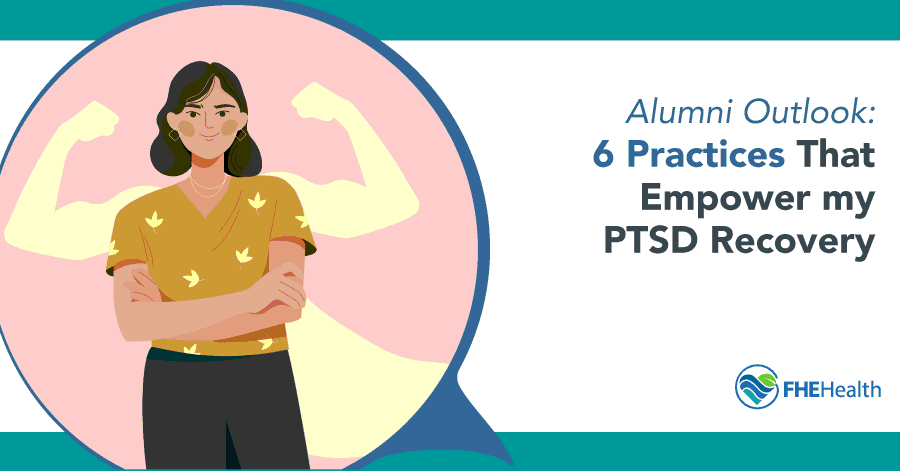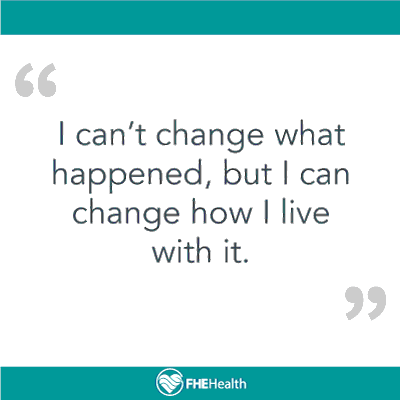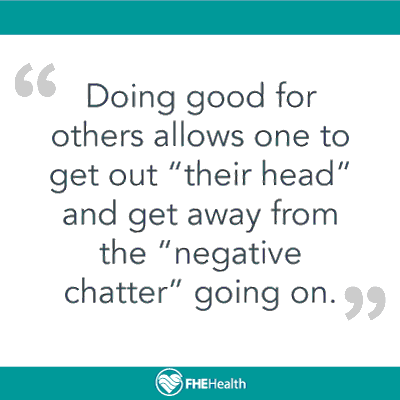
As addressed in my last article, PTSD is a tricky thing. Quite frankly, it can impact all areas of life and for me, increases feelings of hopelessness. Not only did traumatic events take away my power in the moment, the lingering effects of PTSD feel like they do the same for me. The good news is that there are things I can do, in addition to my current toolbox, that help me feel like I have more power. Maybe some of these ideas will help you too.
I can’t change what happened, but I can change how I live with it. I can do things to manage it on a consistent basis. In addition to my toolbox, I have lifestyle habits that help me as well. Those include getting outside, connecting with others (peer support), doing good for others, keeping a rhythm (or routine) to life, creative outlets, and mental breaks.
Getting Outside
 If I’m honest, getting outside is the one I struggle with the most. Winter is hard for many people not located in the southern states. It can contribute to Seasonal Affective Disorder which makes my PTSD symptoms worse. Lack of sunshine can also contribute to lower Vitamin D levels which impacts mood. So, when the weather allows me and the moment the sun comes out, I’m outside as often as I can be. The sun is like a hug for me.
If I’m honest, getting outside is the one I struggle with the most. Winter is hard for many people not located in the southern states. It can contribute to Seasonal Affective Disorder which makes my PTSD symptoms worse. Lack of sunshine can also contribute to lower Vitamin D levels which impacts mood. So, when the weather allows me and the moment the sun comes out, I’m outside as often as I can be. The sun is like a hug for me.
Going outside allows me many options. I can be active, color with sidewalk chalk, play with my kids, or simply relax and enjoy the warmth. When it snows, sledding is a fun thing to do that allows me activity and time with my kids.
Connecting with Others and Peer Support
Connection with others in my circle is a huge thing for me. It also varies from day to day. Sometimes it’s making time to grab a warm beverage (coffee, tea, hot chocolate, etc.) with a friend, other times it is a simple text to a friend saying “hi.” Connecting with others who experience the same struggles I do is also a HUGE thing. It helps me feel less alone.
When I went to FHE, I went with the mindset of “I’m not here to make friends.” I wanted to focus on my recovery. I learned a valuable lesson though. I learned that peer support and friends in recovery is important. I remember talking with someone who had gone through similar trauma and was farther in their program. This was the first time I felt hope for recovery. Chatting with people on the patio, listening to people share musical talents, and building safe relationships helped me build a sense of community that I hadn’t felt before. That community still continues for me in the alumni meetings on Zoom when my schedule allows. Trauma can be isolating but community, even online community, reduces that.
Doing Good for Others
 A key component to any recovery program is the practice of giving back. It’s easy for me to slip into a “poor me” mindset. In AA, I frequently heard the phrase “poor me, poor me, pour me another drink.” I have found that this applies to every aspect of my life.
A key component to any recovery program is the practice of giving back. It’s easy for me to slip into a “poor me” mindset. In AA, I frequently heard the phrase “poor me, poor me, pour me another drink.” I have found that this applies to every aspect of my life.
When I first heard this phrase, it really irritated me. But as I have gone further into my recovery, I have learned that when I feel isolated and don’t do things I need to do, it adds to the negative impact my symptoms have on my life. It also makes it harder to do what I need to do to maintain recovery.
One of the greatest things I can do to get off that slippery slope is to do something good for someone else. This can take a variety of actions. My favorite is to send random positive texts and quotes to people I know. You never know when someone needs it. Another is to help out at a food pantry. I wasn’t able to do this as much during CoVid but now that restrictions are lifting, I’m able to get back to something I enjoy. It gives me a sense of purpose outside of myself and gives me social time too.
Another opportunity for doing good is donating blood and plasma. I can’t do this due to health restrictions, but as someone who receives plasma, it’s a needed opportunity. Your local Red Cross Chapter will post Blood Drive dates and locations on their website. Plus, many give a free cookie.
The alumni team in Florida coordinates volunteer opportunities as well. So those located in that area can give back and connect with fellow alumni. Doing good for others allows one to get out “their head” and get away from the “negative chatter” going on.
Keep a Rhythm
Most people use the word “routine” when describing their day-to-day activities. I like the word rhythm better because it allows for flexibility. I do my best to schedule repeating events at the same time and same day. For example, counseling is always on Fridays at 1:30, PT is Monday and Thursday mornings, Community Support is Tuesdays at 11:30, etc., etc. I then write them down on 3 calendars. One calendar is in a room everyone can see, another is on my phone, and the third is on a small one that I carry with me. This allows for the family to easily communicate what is going on and when and carrying one helps me to easily schedule new appointments while my phone is my backup and reminder calendar for activities because I am forgetful.
Despite all my routines, life still happens. Kids get sick, last-minute activities come up, and mental health needs arise. By allowing myself to have a rhythm, instead of a routine, I provide myself the grace to be flexible when changes arise, often at the last minute. Change can be hard but by focusing on “rhythm” instead of routine, it’s easier for me to navigate. However, if you prefer the word routine, go with that. Recovery is using what works best for you.
Creative Outlet
Now, before you say, “I can’t draw a stick person,” hear me out. Creativity comes in all shapes and sizes. Some people have musical talents, others can draw, some can make gorgeous cakes, others have a gift with words, and some are more athletically talented. No matter what the outlet is, you are engaging in creation. If you are a sports person, every time you practice, you are improving your skill. Even if you don’t think your cake looks good, or your stick person has an oval head instead of a circle, you are still creating. The point of creation is to transfer the internal things to a tangible thing or experience outside of the mind.
Expressing things outwardly can help one process the internal aspects more easily. Sometimes, I don’t have the words to describe how I feel so I sketch a picture. Creating also allows me to keep my hands busy in a healthier manner instead of a self-destructive manner.
Mental Breaks
Finally, the other thing I practice is taking “mental breaks.” Life and mental health recovery take physical and mental energy. Sometimes, it feels draining and I don’t even have the ability tos create (my personal favorite on the list) so I give myself permission to take a “mental break.” I give myself permission to simply exist and do “nothing.” Everybody’s “nothing” looks different and can vary from day to day. Recently, my “nothing” looked like going to my favorite coffee shop, enjoying a coffee, and looking at the art on the walls. Another time, it was spending twenty minutes on my favorite video game, Animal Crossing. Both activities allowed me to not do anything that was mentally taxing. Naps also count as great mental breaks.
In a society that emphasizes the “go-go lifestyle,” there is great power in taking a moment to do “nothing.” Doing “nothing” when needed is actually doing a lot. It is allowing the mental energy “cup” to be refilled so action can be taken.
Any of these steps can be done to help navigate PTSD symptoms. As always, your recovery is unique to you, so do what works best for you. PTSD can impact every area and leave you feeling powerless. Making healthy choices can give you your power back and aid in your recovery. You got this! Your recovery is worth it, and YOU are worth it.






